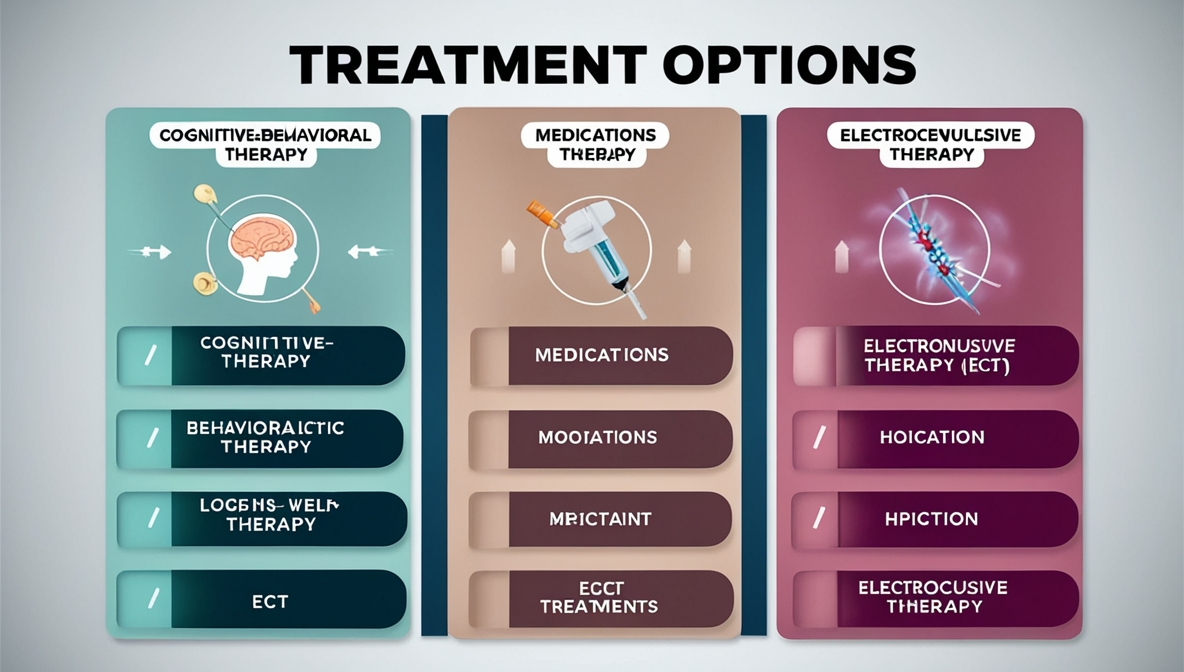Imagine waking up each day feeling like you’re carrying the world’s weight on your shoulders. The moments of joy you once cherished now seem distant and out of reach. You’re not alone in this struggle. Many people experience the physical symptoms of depression, such as weight gain or loss, changes in energy levels, and an overwhelming sense of low mood. This mental illness can make even the simplest tasks seem impossible.
Understanding that depression is not a sign of personal weakness but a treatable mental health condition is a crucial first step. Major depression, or clinical depression, affects millions of people worldwide, impacting how they feel, think, and manage daily life. But there is hope. By acknowledging the warning signs and seeking the right mental health support, you can begin to improve your mood and work towards overcoming depression.
In this guide, we’ll explore practical strategies for relieving depression symptoms, from physical activity to lifestyle changes and effective treatment plans. Whether you’re dealing with severe depression or looking for ways to support someone you care about, these 22 ways will offer insights and actionable steps to help you move forward.
Understanding Depression

Depression, also known as major depression or clinical depression, is a mental illness that profoundly impacts how a person feels, thinks, and manages daily activities. It is a pervasive condition that affects millions of people worldwide, regardless of age, gender, or background.
It’s crucial to recognize that depression is not a personal weakness or character flaw but a treatable mental health condition. Understanding that depression can co-occur with other mental health conditions, such as anxiety or substance abuse, helps to dismantle the stigma surrounding it.
Recognizing the signs and symptoms of depression is essential for early intervention and treatment. This early recognition can make a significant difference in managing the condition effectively and improving overall well-being.
Recognizing Depression Symptoms

Common symptoms of depression include persistent feelings of sadness, hopelessness, and loss of interest in activities. These feelings can be overwhelming and significantly impact daily life.
Depression symptoms can vary from person to person. They may include changes in appetite, sleep patterns, and energy levels. Some individuals might experience physical symptoms such as weight gain or loss, headaches, and digestive issues.
In addition, depression can manifest as irritability, anxiety, or restlessness in some individuals. If you’re experiencing five or more of these symptoms of depression for at least two weeks, it’s essential to seek help from a mental health professional. Early intervention can significantly improve treatment outcomes and overall quality of life.
Seeking Help and Diagnosis

If you’re struggling with depression symptoms, it’s crucial to seek help from a mental health professional. They have the expertise to diagnose depression and develop a treatment plan tailored to your needs.
Depression diagnosed early can greatly improve treatment outcomes and reduce the risk of complications. Early intervention can help manage the condition more effectively and prevent it from worsening.
Don’t hesitate to reach out for help. Mental health professionals are there to support you through the process of understanding and managing depression, and their guidance is essential for effective treatment and recovery.
Treatment Options for Major Depression

Treatment for major depression typically involves a combination of therapy and medication. This integrated approach can address various aspects of the condition and provide comprehensive relief.
Cognitive-behavioral therapy (CBT) is a highly effective treatment for depression. It helps individuals manage negative thoughts, feelings, and behaviors associated with depression. CBT aims to change detrimental thought patterns and improve coping strategies.
Medications, such as antidepressants, can also play a crucial role in relieving depression symptoms and improving mood. These medications work by balancing chemicals in the brain that affect mood and emotional state.
In cases of severe depression that don’t respond to other treatments, Electroconvulsive therapy (ECT) may be recommended. ECT is a medical procedure that can relieve severe symptoms when other methods are ineffective.
Coping Mechanisms and Self-Care

Practicing self-care is essential for managing depression symptoms and improving mental health. Engaging in activities that bring you joy can be a significant part of this process. Whether it’s physical activity, such as exercise, or spending time with loved ones, finding moments of happiness can make a difference.
Developing healthy coping mechanisms is also crucial. Techniques like meditation, deep breathing, or journaling can help you manage negative thoughts and reduce stressful life events. These practices support emotional well-being and offer a way to process feelings constructively.
Additionally, connecting with others—whether through a support group or talking with a trusted friend or family member—can provide valuable emotional support. Building a social support network helps maintain mental health and offers a sense of belonging.
Managing Severe Depression

Severe depression requires immediate attention and treatment to prevent further complications. If you’re experiencing severe symptoms, such as suicidal thoughts or behaviors, it’s crucial to seek help immediately.
A mental health professional can develop a comprehensive treatment plan to address and manage severe depression symptoms. This plan will likely involve a combination of intensive therapies and possibly medications.
Don’t hesitate to contact a crisis hotline or emergency services if you’re in crisis. Immediate support can be lifesaving and essential to getting the help you need.
Supporting Loved Ones with Depression

Supporting a loved one with depression can be challenging, but it’s crucial to be patient, understanding, and supportive. This role requires empathy and a proactive approach to help them navigate their journey.
Educate yourself about depression, including its symptoms, treatment options, and the impact it can have on daily life. Understanding the condition will help you provide better support and avoid inadvertently worsening the situation.
Encourage your loved one to seek help from a mental health professional. Support them in finding appropriate treatment and assist in scheduling appointments if needed.
Offer emotional support by being there to listen and empathize. Connecting them with resources, such as support groups or online communities, can provide additional support layers and help them feel less isolated.
Mental Health and Depression

Depression is a mental health condition that affects millions of people worldwide. It’s a significant aspect of mental health that requires attention and care.
Mental health conditions, such as depression, are treatable with the right treatment plan. Effective management and therapy can lead to substantial improvements in quality of life.
It’s essential to prioritize mental health and seek help if you’re struggling with depression symptoms. Reaching out for support and understanding the available options can make a significant difference.
By talking openly about mental health, we can help reduce stigma and promote awareness. Open discussions encourage others to seek help and foster a supportive environment for those affected by depression.
Conclusion
Depression is a treatable mental health condition that affects millions of people worldwide. It’s important to remember that depression is not a personal weakness but a serious condition that can be managed with the right approach.
By understanding depression, recognizing symptoms, and seeking help, we can significantly improve treatment outcomes and reduce the risk of complications. Effective intervention and support are key to managing this condition and improving overall quality of life.
Don’t hesitate to reach out to a mental health professional if you’re struggling with depression symptoms. Professional support is crucial in navigating the challenges of depression and achieving better mental well-being.







Leave a Reply